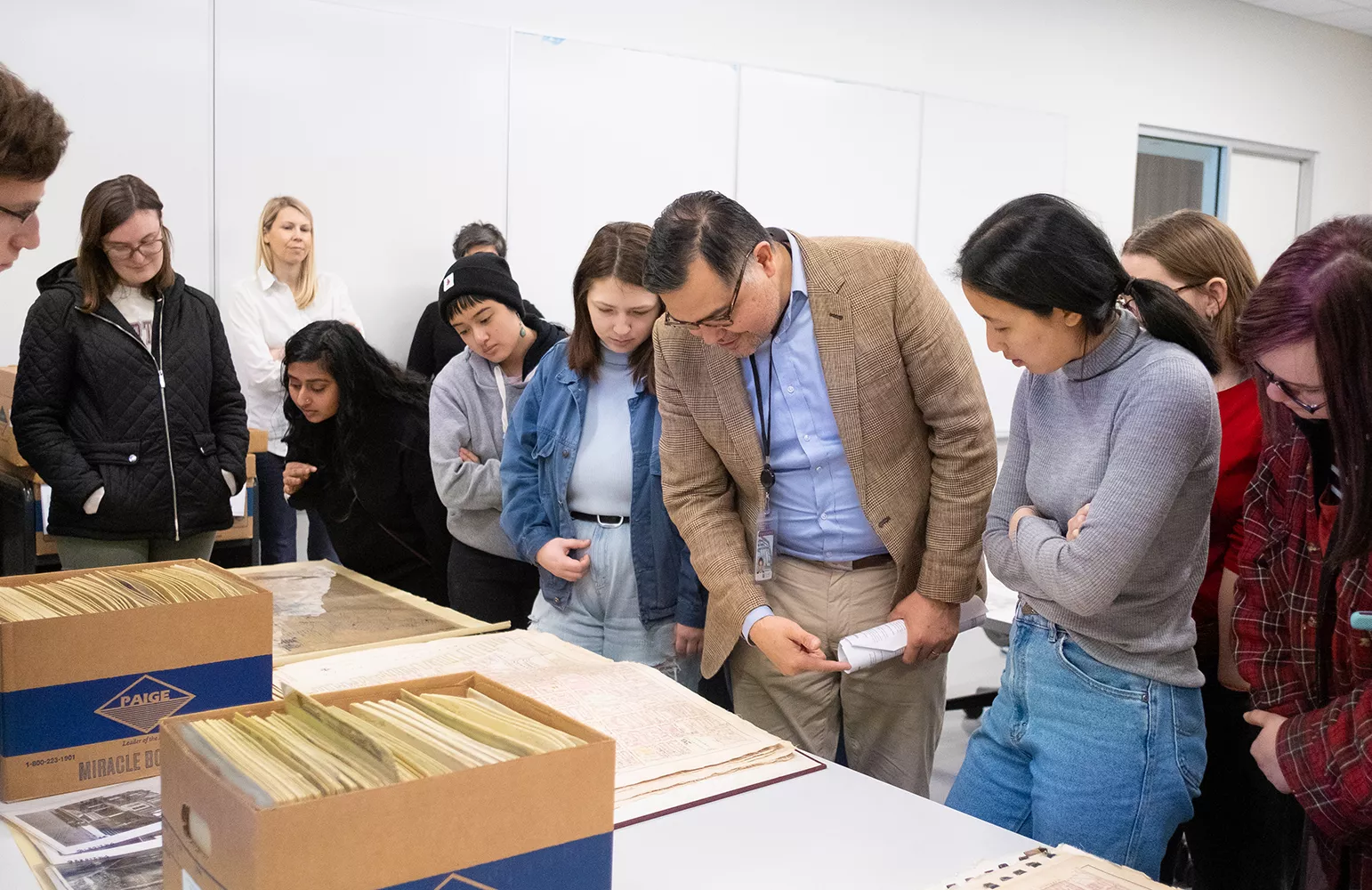
Students in the Tri-Co Philly Program recently visited Temple University’s Urban Archives as part of the program’s core course for this semester, The Philadelphia Mosaic: Immigrant Communities in the City. The Tri-Co Philly Program is a semester-long, non-residential program that provides students both curricular and co-curricular activities in Philadelphia. This urban experience facilitates engagement with the diversity, complexity, innovation, and systems of the city.
Temple University’s Urban Archives documents the development of the greater Philadelphia region and includes four million images and seven million news clippings from the Philadelphia Evening Bulletin. By studying the collection, students enhanced their understanding of Philadelphia’s history and how immigrant communities have transformed the city.
"It has been great to leave Bryn Mawr’s campus and venture out into Philadelphia for this class," says Maya Schneider '22. "I have learned so much about the city through looking at maps and reading, but also by walking and physically getting into the space. I can’t wait to continue getting to know Philadelphia as the weather changes and flowers start to bloom!"
Through the Tri-Co Philly Program, students enroll in urban-focused courses from different disciplines taught by Tri-Co faculty in Philadelphia. For spring 2020, in addition to The Philadelphia Mosaic, students choose an elective in economics or health studies. The urban setting provides a sense of place to enhance the classroom experience, helping students learn how the course material is informed by the environment.
"I've really enjoyed being in Liv's class on immigration and immigrant communities in Philadelphia this semester," says Madeline Svengsouk '21. "This is the first Cities course I've taken, and being able to walk around different neighborhoods and observe phenomena we've been discussing in class has been extremely valuable. It's also contributed to making this a fun and engaging course!"
The program also includes participation in monthly Philadelphia-based activities as well as the opportunity to attend talks and engage with volunteer opportunities in the city.
Tri-Co Philly Program Course Descriptions:
The Philadelphia Mosaic: Immigrant Communities in the City:
This core course explores the experiences and city-making strategies of immigrant communities in the Greater Philadelphia Area from roughly the late 19th century to the present day. It sheds light on how immigrant communities have shaped the city at different points in time and how the Philadelphia metropolitan region, as an urban context, has shaped immigrants’ lives. The course also familiarizes students with Philadelphia’s history, transformations of the metropolitan region in recent decades and current economic, social and spatial dynamics as well as key immigration concepts and theories.
Behavioral Public Policy in the City:
Recent years have seen tremendous growth in the policy influence of behavioral science, a term covering behavioral economics, social psychology, and related fields. Insights from these fields, which explore how individual behavior frequently deviates from so-called "rational choice" models, have helped policymakers develop tools to improve both outcomes for citizens and the way policymakers use data and evidence in their own operations. In this course (which will convene in Philadelphia), students will be exposed not only to the core concepts underlying behavioral science, but also to the nuts and bolts of one high-level policy effort to integrate behavioral science into city government — right here in Philadelphia (though the Philadelphia Behavioral Science Initiative, or PBSI, an academia-policy collaboration under the umbrella of GovLabPHL, a multi-agency team led by the Mayor's Policy Office). Conceptually, the course will cover many behavioral science topics, including judgment under uncertainty, heuristics and biases, self-control and procrastination, and social influence, along with methodological topics related to experiments and their role in social science. Furthermore, students will have the opportunity to interact with a number of guest speakers from city agencies and other city-based organizations, who have worked on behavioral science efforts in the city through PBSI. Field visits and group exercises built around actual, ongoing behavioral science projects in the city are also planned as components of the course.
Philadelphia’s Opioid Crisis: Causes, Consequences, and Interventions:
Opioid-related fatalities are said to represent the deadliest drug crisis in American history. In 2016, drug overdose killed approximately 64,000 people, making it the leading cause of death in Americans under 50. Philadelphia has among the highest overdose death rates in large US counties, and the city government has called this “the greatest public health crisis in a century.” Philadelphia is also poised to become first in the US to open a safe injection site for opioid use, despite opposition from the federal government. Taught in Philadelphia as part of the Tri-Co Philly Program, this course will draw on direct student engagement and the experience of community partners—including medical practitioners, harm reduction activists, politicians, journalists, people who use drugs, and affected communities—to interrogate the causes and consequences of drug overdose. We will also critically analyze political debates about how to respond to the crisis. The course is interdisciplinary and highlights three main lenses through which to analyze the crisis: public health and medical science, values and politics, and social justice and principles of ethical engagement. Students are expected to commit an average of three hours per week to a community placement that addresses the overdose crisis. In the past, students have volunteered with Prevention Point, Pathways to Housing, SOL Collective, and Project SAFE, as well as with the department of health, addiction clinics, and emergency rooms.
The student info session for the Fall 2020 Tri-Co Philly Program will be on Thursday, March 19 at Bryn Mawr and Wednesday, March 25 at Haverford. Students interested in applying are required to attend one session.